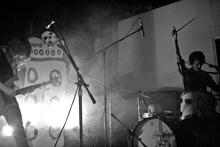Lullabye Arkestra
By wavelength ~ Posted Tuesday, January 30th 2007
Sunday, February 11 12:15pm @ Sneaky Dee’s
Purveyors of: Wavelength’s love child
Since the release of 2002’s much-loved Bzaster, Lullabye Arkestra have established themselves as one of Toronto’s foremost rock‘n’rollers, and are a fitting embodiment of the community ideal. Built around the bass and drum duo of Justin Small and Katia Taylor, the Ark regularly swells to up to 12 members appropriated from all manner of music makers, wielding horns, organs, strings and screams to fill out the band’s brassy doom-soul attack. Co-ordinating such a hefty crew is not always an easy task, and the fact that Justin had his collarbone snapped in a hit-and-run last spring probably didn’t help. After two years they finally released Ampgrave, a magnificent beast of an album.
The album is your first on Constellation. Was it important for you to sign with a label? Is there a way that artists can reach outside an inner local circle without a label, or do they have to rely on this structure to distribute their work?
Katia: It was important for Constellation to be the first people we approached with the record. They’re such amazing, hard-working people who really love music and have such an honourable, ethical approach to the music industry. We kinda lucked out in the fact that they went with it! Crazy dudes!
ustin: Also I think it is important to find resources outside your immediate scene. Lots can come of it. Better distribution, the likelihood you’ll be supported (however minimal) on a tour, better and different avenues to get your music out there. If you do research or luck out, it’d be in your best interest to find someone who shares your vision.
Do you view making music as a career? Do you want to get to a point where you are able to sustain yourself solely from making music? Do you feel that this compromises artistic ideals in anyway?
J: We’re living pretty humbly making a living from music. In fact, [we’re] quite below the poverty line. But it can be done. And no, you certainly don’t have to compromise a thing. Not the way music is being made today. That’s an outdated idea. The big sell-out can come in some real pretty packages, and it really depends on your moral foundation. Nobody should be able to shake you from that, unless deep inside you want to be.
K: I always thought trying to make a career out of music would taint the creativity. We’re obviously not making pop music or trying to write the next big hit, but that doesn’t mean we can’t be successful in what we do. I think success is more about making something that you’re truly proud of rather than making the bucks.
Do spectators owe anything to local bands (as opposed to bands from out of town)? Do local artists owe anything to their local supporters when they reach a certain degree of success?
K: I think the dynamic between artist and audience goes both ways. The artist, whether local or touring, needs to earn the respect of the audience at whatever level. Every band knows the difference between playing to a hometown crowd and playing out of town. The amount of people there or the reaction of the people shouldn’t change the performance they get. I think audiences owe all bands their fullest participation always. Why bother going to a show if you’re going to stand there with your arms crossed or talk through the whole set?
What role do you think Wavelength plays in the local artistic community? Where would you like to see it go and what new challenges would like to see it take on?
K: Wavelength plays a huge role. We’re been involved since almost the beginning. Justin and I actually met at the First Wavelength Anniversary so we can almost credit it for getting the Ark together. It’s also a great platform for musicians to meet up weekly, discuss what’s been going on, what we’re all working on, it’s a great way to keep in touch.
J: Wavelength is one of the most important things to happen to this city’s music scene. Bar none! It really cultivates a sense of excitement and belonging. It’s also nice to see Wavelength presences; there should be more of that. Perhaps dip into the visual arts scene. Get involved soundtracking these events with musicians they know would fit.
If you could have any one support structure in Toronto for the local scene (e.g. grant bodies, a recording/workshop centre), what would it be?
J: Not sure, just keep playing. Find out about grants. Yeah, workshops are helpful. So let’s get the younger kids excited about that. That’d be pretty cool. Help get the idea across that we no longer need to crawl all over each other to get that BIG RECORD DEAL! The Internet’s a big place and what, with technology the way it is, there’s no reason on god’s green earth you can’t release your own Dark Side of the Moon.
By Pras Rajagopalan
